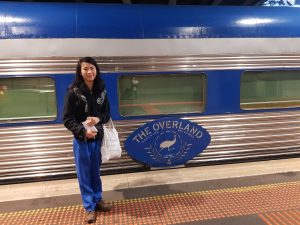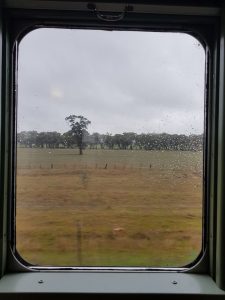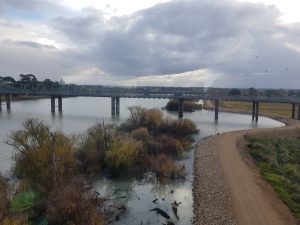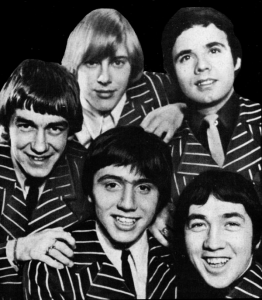A train ride to Adelaide brings back memories. On the train I try unsuccessfully to figure out whether I am sitting in the same carriages than in 2002, when I left Adelaide for a job interview in Melbourne. My first one in Adelaide had been unsuccessful and after 2 weeks of watching the job offers I decided it was time to move on, if I really wanted to get into the work force soon. Melbourne had just more to offer.
So I left the town and boarded The Overlander which was riding trough the night towards the second largest city donwunder which became my second home.
My memory re-imagines a bistro onboard with a sticky carpet, people of mostly younger age holding stubbies and getting tipsy, tired, drunk or all of it until they passed out on seats and in-between, backpackers sleeping on backpacks covering themselves with sleeping bags.
Today it all is a bit tidier but still the train has a steam punk feel. It is not a bullet train, not a Shinkansen, ICE or TGV. The journey takes us West first, to the port, a mobile crane heaving one 40 feet container,
stacking it on another pile, one from hundreds, thousands floundering on land, after their sea journey from China and beyond.

In a rather gentle fashion we trundle through the outskirts of Melbourne, passing through the plains near Werribee, the smell from the water treatment plant creeps in, we see the gentle hills of Brisbane Ranges and arive at the fringes of Geelong. The second city on the Port Phillip Bay is home to 200,000 people, but we only see the industrial area on North Shore, the metal pipes of raffineries and the smoking chimneys.
Finally we leave the bay and travel inland North West towards South Australia. Which sounds pretty much confusing, the state is just South of the middle of the continent, but by far not its southernmost end.
It is raining all the way to the border to our neighbour state, the sky is of leaden grey. Green ist the countryside in this winter season and flat. I can see all the way to the horizon over freshly ploughed fields, at times dotted by white-barked, thinly dressed gum trees or lined by purposely planted dark green bushy Norfolk pines. A wide view which may have inspired some of the Flat Earthers living in this country.

We stop at a few stations or pass slowly through others where nobody is embarking and nobody waits at the platform to hop on. One stop is Ararat, the only Australian town founded by Chinese.
During the gold rush the British and Irish disliked the competition of the Chinese which organised themselves in groups of around ten people and worked and shared the spoils together. They were quite successful that way, compared to the single man armies of White diggers. So the later implored the Victorian state government to impose a 10 pound levy for everyone who was not subject to the English king. This hit the Celestrians, as the Chinese were called then, hard, practically doubling their fare for the voyage by ship from their homeland.
However, the levy was to be collected by the ship captains when the passengers embarked in Victoria. Beyond the border, in South Australa, this collection was not due. So many Chinese went to Robe instead and made their way to the Goldfields. The journey was harder than many expected, the gold was not exactly lying on the ground just behind the dunes. It could take a month, and some left their life trying their way through the unknown, poorly guided at times. A kingdom for a horse! could have been the last sigh of the poor souls who did not make it.
One group of Chinese arrived on a creek on the way, had a rest and washed their dishes, just to find glitters of gold in he cold stream. They tried to keep it secret but have not been. Days later the camp had become a city of hundreds of tents, maybe more. Thus, Ararat was born.
The last Victorian town on the train line is N’hill, The land is inhibited by Aboriginal people for thousands of years. First English visitors arrived in 1845, and two Oliver brothers, Frank and John, decided to build a flour mill here. The town grow from there, and agriculture is still at its heart, particularly wheat farming.
The town must have prospered. In 1892 it was the first Victorian town outside Melbourne served with electricity. The train crew informed us about the existence of the biggest wheat silo in the Southern hemisphere, big enough to keep 145,000 bushels of wheat. I hope I got that right – but I am not certain anymore whether that was in N’hill or one stop earlier, in Dimboola. On the other side of the border, one hour past Bordertown, is another remarkable silo, we are told. This silo is painted by a girl on the side facing the rail tracks. How exciting!
The border was quite unremarkable when crossed by train – all what happened was the staff reminding us too rewind the watch back by half’n’hour. We won 30 minutes today!
Coming by car, one has to get rid of all fresh food when going up North to South Australia. So cars park and people stuff their moth quickly not too waste anything, and I have seen barbeques and improvised stews cooked by the road.
Arriving in South Australia, the rain stopped, and there were glimpses of the sun. We crossed Australia’s biggest river at Murray Bridge. Here they built the first bridge in 1879, for trains, horse carts and pedestrians. It is still in use, sitting beside a new railway bridge we used to cross the Murray.

Short time after, grey and rain resumed.




